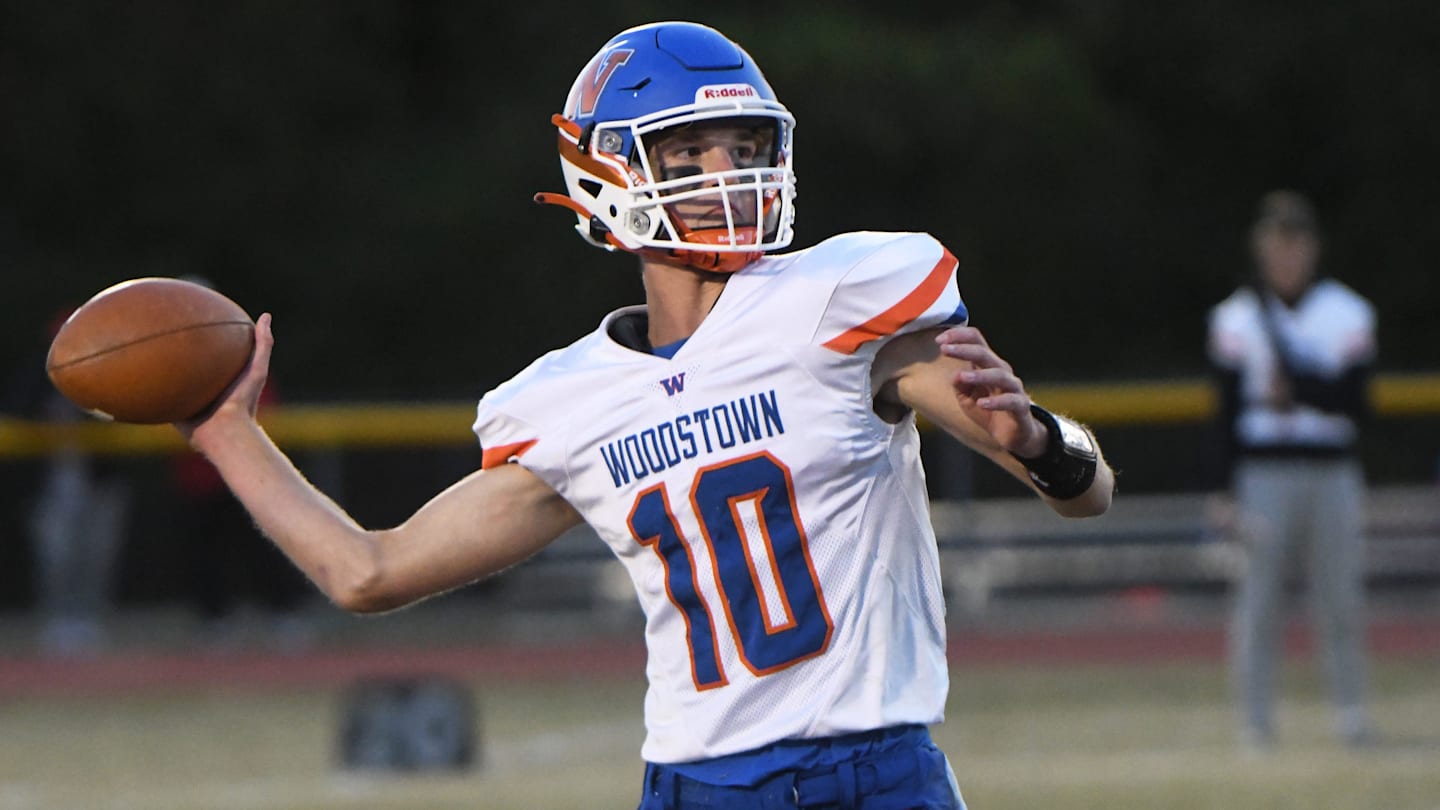New Jersey
New Jersey high school football playoff brackets; Scores, NJSIAA Updates

It’s playoff time for New Jersey high school football with the brackets released in every group in Central, North and South Jersey.
High School On SI is your place to follow along live with each NJSIAA Group. We’ll have in-game scores and every final as well instant updates to each bracket
Here are the New Jersey high school football playoff brackets, with matchups and game times for every classification. To access the bracket for each classification, click on the hyperlinks below.
(1) Woodstown vs. (8) KIPP Cooper Norcross
(5) Pennsville Memorial vs. (4) Burlington City
(3) Middlesec vs. (6) Woodbury
(7) New Egypt vs. (2) Shore Regional
(1) Rumson-Fair Haven vs. (8) Spotswood
(5) Delaware Valley vs. (4) Delran
(3) Haddonfield vs. (6) Hillside
(7) Haddon Heights vs. (2) Wall Township
(1) Somerville vs. (8) Absegami
(5) Allentown vs. (4) Ocean City
(3) Cedar Creek vs. (6) Triton
(7) Delsea vs. (2) Burlingtown Township
(1) Millville vs. (8) Red Bank Regional
(5) Toms River South vs. (4) Marlboro
(3) Central Region vs. (6) Jackson Memorial
(7) Northern Burlington vs. (2) Brick Memorial
(1) Washington Township vs. (8) Hunterdon Central
(5) Cherry Hill East vs. (4) Southern Regional
(3) Old Bridge vs. (6) Cherokee
(7) Eastern vs. (2) Atlantic City
(1) Butler vs. (8) Weehawken
(5) Pompton Lakes vs. (4) Glen Ridge
(3) Mountain Lakes vs. (6) Lenape Valley
(7) Park Ridge vs. (2) New Milford
(1) Westwood vs. (8) Lakeland Regional
(5) Shabazz vs. (4) Caldwell
(3) Pequannock vs. (6) Madison
(7) Rutherford vs. (2) Bernards
(1) Pascack Valley vs. (8) West Milford
(5) Sparta vs. (4) Montville
(3) Passaic Valley vs. (6) Snyder
(7) River Dell vs. (2) West Morris Mondham
(1) Morris Knolls vs. (8) Colonia
(5) Central vs. (4) Mount Olive
(3) Ramapo vs. (6) Randolph
(7) Rahway vs. (2) Ridge
(1) Ridgewood vs. (8) Passaic
(5) Montclair vs. (4) East Orange Campus
(3) Piscataway vs. (6) Bayonne
(7) Linden vs. (2) West Orange
(1) Cedar Grove vs. (8) Wallkill Valley
(5) Belidere vs. (4) Verona
(3) Hasbrouck Heights vs. (6) Wood-Ridge
(7) Boonton vs. (2) New Providence
(1) Glen Rock vs. (8) Waldwick
(5) Becton vs. (4) High Point
(3) Ramsey vs. (6) Lyndhurst
(7) Newton vs. (2) Hanover Park
(1) NV-Old Tappan vs. (8) Weequahic
(5) Summit vs. (4) Cranford
(3) West Morris Central vs. (6) Wayne Hills
(7) Dwight Morrow vs. (2) West Essex
(1) Phillipsburg vs. (8) Nutley
(5) Chatham vs. (4) Wayne Valley
(3) Northern Highlands vs. (6) Westfield
(7) Watchungs Hills Regional vs. (2) Woodbridge
(1) Union City vs. (8) East Side
(5) Irvington vs. (4) Bridgewater-Raritan
(3) Passaic County Tech vs. (6) Plainfield
(7) Morristown vs. (2) Elizabeth
(1) Glassboro vs. (8) Point Pleasant Beach
(5) Riverside vs. (4) Haddon Township
(3) Paulsboro vs. (6) Manville
(7) Audubon vs. (2) Schalick
(1) Camden vs. (8) Middle Township
(5) Willingboro vs. (4) Johnson
(3) Manchester Township vs. (6) West Deptford
(7) Gloucester City vs. (2) Point Pleasant Boro
(1) Hopewell Valley Central vs. (8) Nottingham
(5) Timber Creek Regional vs. (4) Seneca
(3) Holmdel vs. (6) Oakcrest
(7) Barnegat vs. (2) Mainland Regional
(1) Winslow Township vs. (8) Princeton
(5) Pennsauken vs. (4) Manalapan
(3) Shawnee vs. (6) Middletown South
(7) Steinert vs. (2) Middletown North
(1) Toms River North vs. (8) Bridgeton
(5) Kingsway vs. (4) Howell
(3) Hillsborough vs. (6) Freehold Township
(7) Edison vs. (2) Rancocas Valley

New Jersey
New Jersey State Police Gave a ‘Free Pass’ to Motorists with Courtesy Cards or Ties to Police, Investigation Finds – Insider NJ

The Office of the State Comptroller found even motorists suspected of dangerous driving offenses were let go by New Jersey State Police.
TRENTON—An investigation finds that New Jersey State Police troopers routinely gave preferential treatment to certain motorists who presented a courtesy card or asserted a personal connection to law enforcement—even when motorists were suspected of dangerous offenses, like drunk driving, according to a new report by the New Jersey Office of the State Comptroller.
OSC’s Police Accountability Project reviewed body worn camera footage of 501 no-enforcement stops by New Jersey State Police–meaning stops where New Jersey State troopers did not issue tickets or make arrests. In 139 or 27 percent of these no-enforcement stops, motorists presented a courtesy card, claimed to have a friend or relative in law enforcement, or flashed a law enforcement badge and then were let go, OSC’s report said. In some cases, the trooper released the motorist immediately, offering some version of “you’re good.” The report found that courtesy cards are in wide usage and function as “accepted currency” by state troopers. (In all but one case, the troopers gave the courtesy card back to the motorist, enabling the card to be used again.)
Reviewing more than 50 hours of body worn camera footage of the stops, which took place over ten days in December 2022, OSC found that troopers regularly decided not to enforce motor vehicle laws after receiving a courtesy card or being told the driver has ties to law enforcement. For instance, one motorist, who was stopped for driving over 90 miles per hour, admitted to drinking alcohol but was let go without a sobriety test after he presented two courtesy cards. Another motorist was stopped for driving over 103 miles per hour and was released after she volunteered that her father was a lieutenant in a local police department. The most significant consequence the troopers imposed in these stops was advising the motorists that they had left a voicemail message for the law enforcement officer named on the courtesy card or invoked as a friend or relative. OSC has released video excerpts of the footage.
“Our investigation shows that some people are being given a free pass to violate serious traffic safety laws,” said Acting State Comptroller Kevin Walsh. “Law enforcement decisions should never depend on who you know, your family connections, or donations to police unions. Nepotism and favoritism undermine our laws and make our roads more dangerous.”
Overall, close to half of the 501 non-enforcement stops reviewed by OSC involved speeding, many for more than 20 miles per hour over the speed limit. In three stops, drivers stopped for reckless driving, careless driving, and/or speeding, also admitted to drinking alcohol, yet were released without being asked to step out of the car for a field sobriety test. Both drunk driving and speeding are major causes of traffic fatalities. According to data compiled by the New Jersey State Police Fatal Accident Investigation Unit, in 2022, New Jersey recorded 646 fatal collisions that resulted in 689 deaths or 1.89 fatalities per day. This was among the highest number of traffic-related deaths in New Jersey in the past 15 years.
OSC initiated this investigation in response to reports that law enforcement officers’ decisions not to enforce motor vehicle violations were influenced by improper factors, including courtesy cards. Courtesy cards, often referred to as PBA cards, FOP cards, or gold cards, are given out by police labor associations to law enforcement officers. They also can be purchased through “associate memberships” with police associations and are sold by private companies.
OSC’s investigation found that courtesy cards are widely used. In 87, or 17 percent, of the no-enforcement stops OSC reviewed, motorists presented courtesy cards that came from municipal police departments, county and state agencies, as well as inter-state and out-of-state law enforcement agencies. They all appeared to be equally effective at getting motorists released without enforcement.
Asserting a relationship with law enforcement appeared to carry equal weight, OSC found. In 52 or 10 percent of the no-enforcement stops reviewed, the driver or passengers did not present a courtesy card but claimed a connection to law enforcement, and the trooper decided to let them go. In 29 of those stops, the motorist or passenger identified themselves as current, retired, or in-training law enforcement officers. Other stops resulted in no enforcement when the drivers or passengers claimed a relative, friend, or neighbor worked in a law enforcement agency.
In one stop, a trooper said he stopped a motorist for driving 97 miles per hour. After an extended conversation about the “friends” they had in common, the trooper told the driver to “stay safe” and let him go. In another stop, a trooper performed a computerized look-up of the driver’s credentials and discovered the driver had an active warrant for his arrest. But when the driver’s friend introduced himself, letting the trooper know that he was also an off-duty trooper, the stopping trooper walked back to the motorist, apologized for stopping him, and let him go without even mentioning the warrant. OSC was unable to determine from the footage what the warrant was for.
Other findings include:
- Providing preferential treatment to motorists who present courtesy cards or assert close personal relationships with law enforcement appears to have a discriminatory impact. Of the 87 courtesy cards observed in the sample, for instance, 69 were presented by White drivers.
- Even when courtesy cards were not present, racial disparities were observed in the sample. New Jersey State Police policy requires troopers to request all three driving credentials (license, registration, proof of insurance) when making motor vehicle stops, but OSC found overall, White and Asian drivers were less likely to have all three of their credentials requested and verified when compared to Black and Hispanic/LatinX drivers. Additionally, troopers conducted computerized lookups of Hispanic/LatinX drivers 65 percent of the time, while looking up White drivers only 34 percent of the time.
- In many stops, OSC was unable to ascertain why the troopers made the decision not to enforce motor vehicle violations because of the quality of the video footage or other factors. Still, OSC observed several of those stops involved dangerous offenses, underscoring the importance of reviewing no-enforcement motor vehicle stops, which are not routinely reviewed.
OSC made 11 recommendations, including that New Jersey State Police regularly review no-enforcement stops to better understand racial/ethnic trends in motor vehicle data and determine if additional training is needed. OSC also recommended that the Attorney General consider issuing a directive that would explicitly prohibit law enforcement officers from giving preferential treatment to motorists because of their ties to law enforcement or possession of courtesy cards.
Read the report.
Watch excerpts of the body camera footage.
Sign up now for OSC’s newsletter.
New Jersey
Authorities Debunk Viral Explanation for NJ Drone Sightings

The drones spotted over the Garden State were probably not looking for a missing shipment of radioactive material.
New Jersey
N.J. weighs making underage gambling no longer a crime, but subject to a fine

Should underage gambling no longer be a crime?
New Jersey lawmakers are considering changing the law to make gambling by people under the age of 21 no longer punishable under criminal law, making it subject to a fine.
It also would impose fines on anyone helping an underage person gamble in New Jersey.
The bill changes the penalties for underage gambling from that of a disorderly persons offense to a civil offense. Fines would be $500 for a first offense, $1,000 for a second offense, and $2,000 for any subsequent offenses.
The money would be used for prevention, education, and treatment programs for compulsive gambling, such as those provided by the Council on Compulsive Gambling of New Jersey.
“The concern I had initially was about reducing the severity of the punishment,” said Assemblyman Don Guardian, a Republican former mayor of Atlantic City. “But the fact that all the money will go to problem gambling treatment programs changed my mind.”
Figures on underage gambling cases were not immediately available Thursday. But numerous people involved in gambling treatment and recovery say a growing number of young people are becoming involved in gambling, particularly sports betting as the activity spreads around the country.
The bill was approved by an Assembly committee and now goes to the full Assembly for a vote. It must pass both houses of the Legislature before going to the desk of the state’s Democratic governor, Phil Murphy.
-

 Business1 week ago
Business1 week agoOpenAI's controversial Sora is finally launching today. Will it truly disrupt Hollywood?
-

 Politics5 days ago
Politics5 days agoCanadian premier threatens to cut off energy imports to US if Trump imposes tariff on country
-
/cdn.vox-cdn.com/uploads/chorus_asset/file/25782636/247422_ChatGPT_anniversary_CVirginia.jpg)
/cdn.vox-cdn.com/uploads/chorus_asset/file/25782636/247422_ChatGPT_anniversary_CVirginia.jpg) Technology6 days ago
Technology6 days agoInside the launch — and future — of ChatGPT
-
/cdn.vox-cdn.com/uploads/chorus_asset/file/25789444/1258459915.jpg)
/cdn.vox-cdn.com/uploads/chorus_asset/file/25789444/1258459915.jpg) Technology4 days ago
Technology4 days agoOpenAI cofounder Ilya Sutskever says the way AI is built is about to change
-

 Politics4 days ago
Politics4 days agoU.S. Supreme Court will decide if oil industry may sue to block California's zero-emissions goal
-
/cdn.vox-cdn.com/uploads/chorus_asset/file/25546252/STK169_Mark_Zuckerburg_CVIRGINIA_D.jpg)
/cdn.vox-cdn.com/uploads/chorus_asset/file/25546252/STK169_Mark_Zuckerburg_CVIRGINIA_D.jpg) Technology5 days ago
Technology5 days agoMeta asks the US government to block OpenAI’s switch to a for-profit
-

 Politics6 days ago
Politics6 days agoConservative group debuts major ad buy in key senators' states as 'soft appeal' for Hegseth, Gabbard, Patel
-

 Business3 days ago
Business3 days agoFreddie Freeman's World Series walk-off grand slam baseball sells at auction for $1.56 million
















